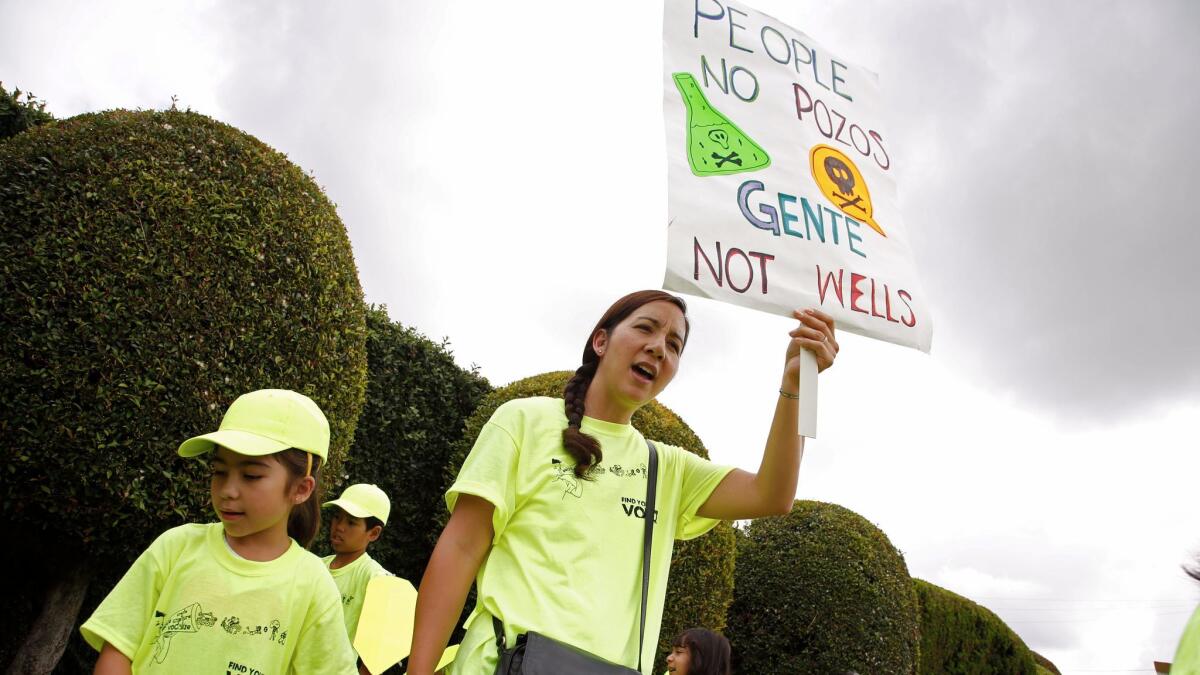City orders tougher rules for oil drilling site near South L.A. homes

City officials issued a set of stringent rules Friday that an oil company must follow if it wants to continue operating a drilling site next to homes in South Los Angeles.
Included is a requirement that all drilling equipment be permanently enclosed in a 45-foot-tall structure to dampen noise, reduce odors and block bright lights. That was a key demand from community activists, who had argued that the site at Jefferson Boulevard and Budlong Avenue was an example of the noxious effects of oil drilling in urban neighborhoods.
The facility, which is overlooked by apartments west of the USC campus, faces what officials described as the toughest rules imposed on any drilling site in L.A. The action was quickly lauded by environmental and neighborhood activists as a pivotal step.
“The city has finally listened to the concerns of the community,” said Richard Parks, president of the South L.A. nonprofit Redeemer Community Partnership.
But Sentinel Peak Resources, which runs the Jefferson Boulevard site, said the need for tougher rules was unsubstantiated.
“This means that any business could be subject to onerous restrictions placed on them, frankly, without merit,” said Christine Halley, its director of environmental health and safety. “That’s what we’re facing.”
Parks and other community activists had lobbied the city to hold a public hearing earlier this year on whether the site was operating in line with requirements — and whether stiffer rules were needed to protect neighbors from noise, foul smells and other nuisances.
In addition to enclosing drilling equipment, the decision released Friday requires monitoring systems to continuously track noise and vibrations, as well as to detect noxious fumes and inform people of the results online in real time. Sentinel Peak Resources also would have to alert the Los Angeles Fire Department if hydrogen sulfide or methane were detected.
Angela Johnson Meszaros, an attorney with the environmental law firm Earthjustice, said the monitoring systems would help hold the facility accountable.
“We can do away with the ‘he said, she said’ disputes about whether or not there are impacts,” Meszaros said.
Theodore Irving, an associate zoning administrator with the city, also ordered the facility to bar its trucks from traveling north on residential streets alongside the drill site, undergo regular reviews and appoint a community liaison. Flouting any of the new rules would be a misdemeanor punishable by a fine of up to $2,500 and six months in jail. In his decision, Irving warned that zoning officials would refer any possible violations to the city attorney’s office.
The new rules “may very well represent the most stringent set of operating conditions on a drill site in the country, and I expect nothing less in South Los Angeles,” City Councilman Marqueece Harris-Dawson, who represents the area, said in a statement.
The Jefferson site, which was first approved more than half a century ago, sits closer to homes than any other Los Angeles drilling facility, according to the nonprofit Community Health Councils.
In his decision, Irving found that it had not been following soundproofing and insurance requirements, and deemed the existing rules insufficient to protect the neighborhood.
Petroleum Administrator Uduak-Joe Ntuk, who was hired last year to oversee oil and gas operations in the city, noted in a report that a state agency had designated the Jefferson Boulevard site as an area with hydrogen sulfide gas, which can give off an odor like rotten eggs and cause people to lose their sense of smell. Toxic chemicals such as benzene have also been emitted from the site, Ntuk wrote.
In recent years, oil droplets have been sprayed onto cars in the neighborhood, and the South Coast Air Quality Management District twice issued violations to the company for excessive emissions. In one case, an inspector said he smelled an odor like diesel exhaust.
The rules for the Jefferson site, Ntuk said, are stricter than those imposed under a court order on the Allenco drill site in University Park, which shut down amid complaints of nosebleeds and other health problems. But the requirements were “not new to the industry.”
“We’re in the middle of a neighborhood,” Ntuk said. “We have a role and a responsibility to maintain quality of life and public health in the city.”
But petroleum companies tied to the drilling site have defended its track record: Freeport-McMoRan Oil and Gas, the previous operator of the facility, said it had changed its practices after “an oil and water mist” drifted from the site years ago. Sentinel Peak Resources, which bought the operation in December, has said that no problems were identified during recent inspections by the Fire Department and that allegations of noise and odors “were apparently not sufficient to constitute a violation.”
Such claims have been “fueled by special interest groups” with a vendetta against the oil industry, Halley said.
Sentinel Peak Resources plans to appeal the decision, Halley said. Under the decision released Friday, the company is supposed to begin construction on the enclosure within nine months of the rules going into effect, but that process would be delayed during the appeal.
Twitter: @LATimesEmily
More to Read
Sign up for Essential California
The most important California stories and recommendations in your inbox every morning.
You may occasionally receive promotional content from the Los Angeles Times.











